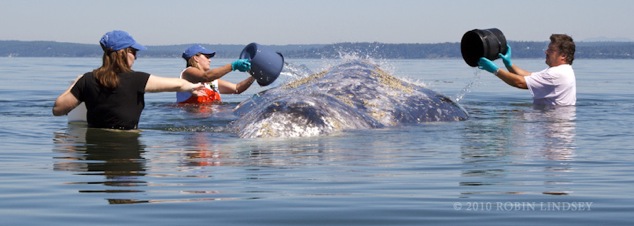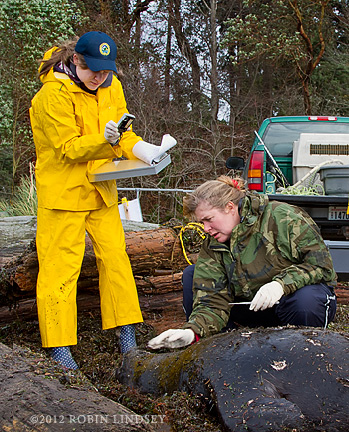Act now - marine mammal funding eliminated from Fed's budget
Apr/12/13 01:53 PM
 (update: Prescott will be included in the 2014 budget, but funding is greatly slashed)
(update: Prescott will be included in the 2014 budget, but funding is greatly slashed)Yesterday it was learned that critical funding for marine mammal stranding response and research has been eliminated from the proposed fiscal year 2014 Federal budget and NOAA budget. Nationwide, marine mammal stranding networks are run through non-profits and other non-government entities and coordinated through NOAA’s National Marine Fisheries Service (NMFS). These networks are heavily dependent on funding from the John H. Prescott Marine Mammal Rescue Assistance Grant Program.
Stranding networks are the nation’s first responders to both live and dead marine mammals that come ashore (or are entangled off shore), often in urban coastal communities. Responders are usually the only means of intervention between wild and potentially dangerous marine mammals and a curious, but largely unwitting, public. Additionally, network responders collect biological specimens from stranded animals to monitor emerging, infectious, and zoonotic (transmissible to people) diseases in areas frequented by the public.
Infectious diseases have been showing up in marine mammals at an alarming rate in recent years. Network responders play an essential and unique role in identifying dangerous pathogens in marine mammals that share our shores. Their work is not only necessary for minimizing risks to public health and safety, but for developing a better understanding of the health risks facing these animals and our marine ecosystem.
Marine mammals are sentinels for the health of our oceans - and our first line of detection of ominous changes in the marine environment.

The public demands a response to marine mammals in need and the elimination of Prescott Funds for response and research will drastically impact this ability. There will be severe public backlash when animals cannot be responded to at the level the public expects. For both public and animal safety, strandings are best responded to by trained individuals. Without a professional response to strandings, the public will resort to taking matters into their own hands, with the potential for injury or death to humans.
Rehabilitation facilities across the country also depend on Prescott Funding for their work and will be severely compromised. Some will close. Many largely-volunteer networks will cease to exist without this funding.
Please contact your congressional representative and stress the need for Prescott Funds to be reinstated for this essential work. The Prescott Fund is a minute percentage of the Federal budget. International Fund for Animal Welfare (IFAW) has an easy method to contact Congress and make your voice heard. Please click here to act now!
You can also contact the President via the White House website. Click here to ask President Obama to reinstate the John H. Prescott Grant Program.
NOTE:
Seal Sitters receives no Prescott Funding (or financial support from any Federal, State or City agencies) for our work. We rely on public contributions for our stranding response and educational outreach. If you’d like to make a donation, please click here.
Read here about Seal Sitters’ Year of the Seal grant project, designed to raise awareness about human impact on marine mammals and the health of our marine ecosystem.







